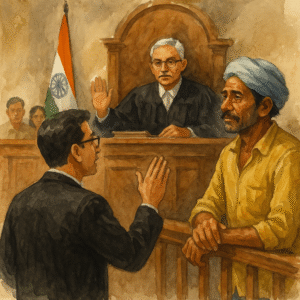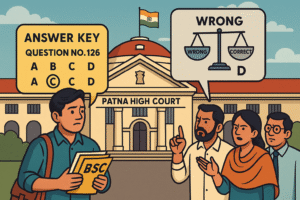The Patna High Court (Single Bench) set aside the dismissal of a government employee working as a village-level watchman (chaukidar) and directed that the departmental proceedings be kept in abeyance until the conclusion of the related criminal trial. The Court further ordered reinstatement within 30 days.
In this writ petition, the aggrieved person (petitioner) initially challenged an order of the District Magistrate initiating a departmental enquiry. During the pendency of the writ, a final order was passed dismissing him from service based solely on the filing of a chargesheet in a criminal case. With leave of Court, the petitioner amended his challenge to include the dismissal order (Memo No. 804 dated 16.07.2020).
The brief background is as follows. An FIR arising from a bank incident led to Majhauliya Police Station Case No. 15 of 2016 under Sections 457/380 IPC. The police later submitted a chargesheet on 25.03.2016 naming four accused, including the petitioner. On that basis, the Superintendent of Police requested dismissal, and a departmental proceeding was initiated, culminating in a dismissal order on 16.07.2020.
The petitioner’s consistent case was that the only “misconduct” cited was the filing of a criminal chargesheet; there was no independent allegation of indiscipline or dereliction of duty. He also contended that the Enquiry Officer was replaced after he twice advised that the matter be kept in abeyance until the criminal trial concluded.
The record showed that the Senior Deputy Collector, acting as Enquiry Officer, had indeed recommended awaiting the court’s decision, but the District Magistrate later appointed another Enquiry Officer, who ultimately submitted an adverse report.
Assessing the matter, the High Court found the disciplinary authority had treated the mere filing of a criminal chargesheet and statements of co-accused as conclusive proof of misconduct, without any independent evidence. The Court noted that a chargesheet is not proof of guilt and criticized the reliance on the case diary statements of co-accused. It referred to the National Police Commission’s observations (as noticed in precedent) and reiterated that members of a uniformed force cannot be terminated merely because a criminal trial is pending.
Accordingly, the High Court set aside the dismissal order (Memo No. 804 dated 16.07.2020), directed reinstatement within 30 days, and ordered that the departmental proceedings remain stayed until the criminal trial concludes. Consequential benefits were left for decision after the departmental proceedings, with directions if the petitioner is acquitted and no fresh departmental action is taken.
Significance or Implication of the Judgment
This judgment reinforces a vital procedural safeguard in public employment—particularly for uniformed, disciplined cadres such as village watchmen, home guards, and police support staff. It clarifies that disciplinary authorities cannot treat the filing of a criminal chargesheet as automatic proof of misconduct. Departmental punishment, especially dismissal, must be based on independent evidence that establishes misconduct on a preponderance of probabilities, not on untested allegations in a pending criminal case. The High Court’s approach discourages premature or punitive administrative action that risks stigmatizing employees before courts have adjudicated their criminal liability. It also preserves administrative discipline by allowing the departmental case to continue after the criminal trial, if necessary, thus balancing fairness to the employee with the employer’s right to maintain discipline. For government departments across Bihar, the decision acts as a caution: when criminal and departmental proceedings overlap, authorities must carefully consider whether proceeding immediately would prejudice fairness or rely solely on unproved allegations. The reinstatement direction, coupled with a specific timeframe and a reasoned approach to consequential benefits, offers a clear template for handling similar cases.
Legal Issue(s) Decided and the Court’s Decision (with reasoning)
- Whether the disciplinary authority can dismiss a uniformed government employee solely on the basis that a criminal chargesheet has been filed against him in a pending case.
Decision: No. The Court held that the disciplinary authority acted in haste and without independent evidence of misconduct. Reliance only on a criminal chargesheet and case diary statements of co-accused is legally unsustainable. - Whether the departmental proceedings should continue while the criminal trial is pending.
Decision: The departmental proceedings should be kept in abeyance until the criminal trial concludes. The matter was remitted to the disciplinary authority with this direction. - Relief and timelines.
Decision: The dismissal order (Memo No. 804 dated 16.07.2020) was set aside, and reinstatement was directed within 30 days from the date of judgment, with consequential benefits to be decided after the departmental proceedings, especially in the event of acquittal.
Judgments Referred by Parties (with citations)
- Brij Kumar Singh v. State of Bihar (Patna High Court, order dated 09.11.2010) — quoted by the disciplinary authority to emphasize higher standards for uniformed services and the “preponderance of probabilities” standard in departmental inquiries.
Judgments Relied Upon or Cited by Court (with citations)
- Joginder Kumar v. State of U.P., AIR 1994 SC 1349 — cited for the principle that arrest/accusation alone cannot justify punitive action; also for the National Police Commission observations regarding unjustified arrests and jail expenditure.
Case Title
Petitioner v. State of Bihar & Ors. (Patna High Court, Single Bench)
Case Number
Civil Writ Jurisdiction Case No. 10746 of 2019.
Citation(s)
2021(2) PLJR 557
Coram and Names of Judges
Hon’ble Mr. Justice Rajeev Ranjan Prasad.
Names of Advocates and who they appeared for
- For the petitioner: Mr. Sanjay Kumar No. 7, Advocate.
- For the State: Mr. Anil Kumar, AC to SC-8.
Link to Judgment
MTUjMTA3NDYjMjAxOSMxI04=-mxFhLQyMnOg=
If you found this explanation helpful and wish to stay informed about how legal developments may affect your rights in Bihar, you may consider following Samvida Law Associates for more updates.








